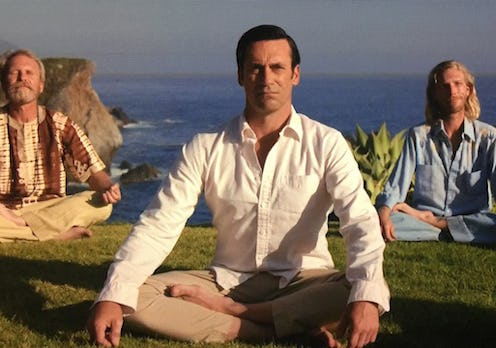Entertainment
Did 'Mad Men's Don Draper Redeem Himself?

Well, the series of finale of Mad Men premiered on Sunday, May 18, and I am feeling everything. I'd be remiss if I didn't pay accolades to the series' creator, Matthew Weiner, for wrapping up the story arcs of the characters we have come to know and love — or at least love/hate — for seven seasons with a finale that was equal parts heartbreaking and heartwarming. Throughout Mad Men's plight, Weiner has led fans through a confection of character-driven plot points and twists, and deftly juxtaposed pivotal facets of the 1960s against the progression that we currently experience in the 21st century. Even when Weiner's guidance seemingly ushered us off the beaten path (i.e., those moments where you found yourself thinking, "what the frick is the point of this?"), revelations — and a rewind of methodically placed clues and product placements — would bring about the "aha" moments that everything in the series had gone exactly according to Weiner's plan, down to the shrewdest detail.
One of the central questions plaguing fans' minds was the fate of protagonist — and the quintessential antihero, if there ever was one — Don Draper. I, personally, had been getting extremely fed up with Don over the past few episodes. After toggling between different attempts at satisfaction (the whole chronic infidelity thing wasn't one of the attempts I gave any sort of thumbs up to), Don decided "screw this!" during a meeting at McCann-Erickson and endeavored on a hapless road trip across the country, wherein he: attempted to track down a troubled waitress he barely knew (ugh); got hit in the face with a phone book (this is why you need to plan out your trips before taking them); relinquished his car (double ugh), and slept with a young woman he met at an auto shop who went foraging through his belongings.
I was basically about over Don at this point — like, Taylor Swift's "We Are Never Ever Getting Back Together" over it. Ugh. Still, a moment came fairly early in the finale that showcased Don in a remorseful — albeit, sobering — light. When Don calls Sally and learns that Betty is dying of lung cancer, he is quick to make plans to head back to New York City and calls Betty straight away. In one of the possibly most tearjerking moments of the finale, Betty rescinds Don's offer to return home and invite their children to live with him. She explains that she had laid out plans for the children to live with their aunt and uncle where they can have a normal family structure, "and your being here is not part of that."
The look on Don's face acknowledges his remorse over the fact that he can't deny: he has not been a stable presence — or very present at all — in his children's lives. Tearfully he chokes out, "Birdie..." before Betty assertively — yet compassionately — tells him they will talk soon. I need to reach for a tissue just thinking about it.
There was a part of me that wanted Don's seeming enlightenment on his absence to be a turn-around moment where he realized "what the heck am I doing in the middle of nowhere?" and head back to New York City to talk comfort his dying ex-wife in person. Obviously, that didn't happen. Don continues down his self-deprecating path and visits Stephanie Horton, who takes him with her to a retreat in California which is rife with therapy sessions, yoga, and one guy who can't stand wearing a shirt (no hate, of course — live and let live). I was still appropriately annoyed with Don, but softened when he made a call to Peggy after realizing he had been abandoned by Stephanie — who "didn't even say goodbye" — when he had finally resolved to return to NYC.
While Peggy attempted to pacify Don's crisis and encouraged him to reclaim his spot at McCann-Erickson — "don't you want to work on Coke?" — Don crumbled, telling Peggy "I'm not the man you think I am," lamenting, "I broke my marriage vows...I scandalized my daughter...I took another man's name and made nothing of it." At this point, I really felt for Don. This sympathy was cemented during a group therapy session at the commune, where a man broke down over feeling unappreciated and unloved, all while realizing he didn't understand the concept of love himself, and Don went to hug the man as he began to sob himself.
This all led to the finale's (very much tweeted about) conclusion. Don is seated lotus-style during a meditation session and during a finale"om" we see the flicker of a smile crack his face and the scene fades out to an actual Coca-cola commercial featuring the jingle, "I'd Like to Buy the World a Coke." I had to let everything register — and, of course, check my Twitter feed — but apparently we are to assume from here that just as Don reached his point of self-realization and enlightenment, he managed to come up with his most iconic ad campaign ever, and we are to assume he returned to McCann-Erickson with this idea.
Did Don Draper redeem himself? Did his supposed return to NYC simply mark the fact that he will forever be a victim of taking two steps forward, only to return to the place he originated at? As an optimist, I like to believe that Don would return to advertising with a clearer head, with greater empathy, and with the ability to look toward the future and the positives around him, as opposed to entrenching himself in the pitfalls.
But that's just me.
Images: AMC; Giphy (4)